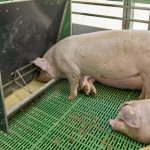
News

Bunge, Viterra offer to sell assets in two EU countries, sources say
U.S. grains merchant Bunge and Glencore-backed Viterra have offered concessions aimed at winning EU antitrust approval for their $34 billion merger, the European Commission website showed on Friday.

Precision livestock farming could fine-tune feed efficiency ‘equation’
A Belgian researcher says precision technology can help farmers fine-tune animal feed consumption, which would increase profits, improve animal welfare and lower environmental effects.

La Niña weather 70 per cent likely to develop in Aug-Oct
The current neutral phase between La Niña and El Niño weather patterns is expected to continue for several months, with a 79 per cent chance of La Niña November through January, the National Weather Service's Climate Prediction Center (CPC) said in its monthly forecast.

Meat from cloned animals sparks debate
Is a cloned cow any different from a conventionally conceived cow when it comes to meat? Canadian officials suggest not
Health Canada says meat from healthy cloned animals is no different than that from sexually reproduced animals and there are no health concerns with consuming meat from a cloned animal. It also says a main aspect of cloning animals is to “enhance the propagation of unique, high-value animals.”

New ag tech pitch event to precede AgSmart
Discovery Lab brings its tech startup process to agriculture
A new event in conjunction with AgSmart at Olds College aims to bring mainstream technology startup support to the agriculture sector.

BASF to close two glufosinate production sites
BASF plans to shut down two sites in Germany that are part of its production network for the glufosinate-ammonium weed killer, the German chemicals group said on Wednesday.

Explainer: How U.S. states are testing for bird flu
States in the U.S. are playing a key role in the nation's response to a growing outbreak of avian flu among dairy cattle that has also infected a small number of humans.
The states are chiefly responsible for testing cows and people for the virus, but they take different approaches. Scientists tracking bird flu are increasingly concerned that current surveillance efforts are not sufficient.

Global crop yields have not kept up with increasing demand
Sluggish production blamed on adverse weather conditions and high input costs that lead to reduced fertilizer use
The global stocks-to-use ratio for the major crops, excluding China, has been trending down since 2018, Jason Newton, Nutrien’s chief economist, told delegates attending the 24th International Farm Management Association Congress in Saskatoon.

Maple Leaf Foods plans to split into two independent public companies
Maple Leaf Foods is splitting into two independent public entities by spinning off its pork business, it said today.
Maple Leaf Foods will retain a 19.9 per cent ownership position in the newly formed pork company, the name of which will be announced in the coming months, the company said.

New Canadian feed regulations released
Long-awaited feed regulation update offers more flexibility, risk-based approach, focus on food safety
The Canadian Food Inspection Agency (CFIA) has released their long-promised update to national feed regulations. Formally referred to as the “Feeds Regulations, 2024,” the final version of the framework was registered June 17 and published for public view July 3 in part 2 of the Canada Gazette.



